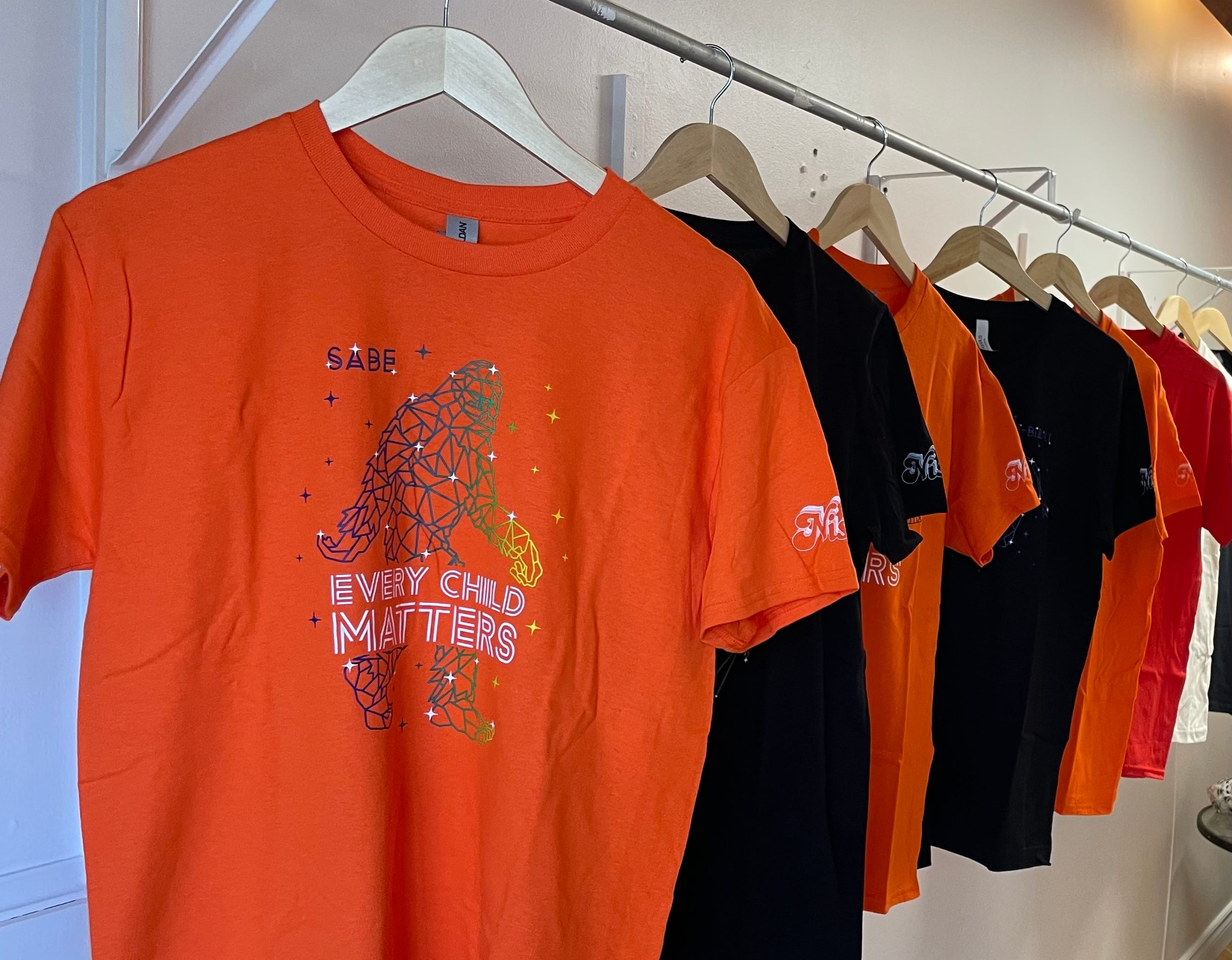Share
Metrolinx partners with Nish Tees for Orange Shirt Day
Frontline staff will wear orange shirts made by an Indigenous-owned business.
Sep 26, 2024
James Hodgson did not plan to become a screen printer. Growing up in Oakville, the business owner and artist attended Trent University for Native Studies, along with roughly half of his classmates who, like him, were adopted into non-Indigenous families during the Sixties Scoop. Motivated by the pursuit of identity like most 20-somethings, Hodgson sought to learn about his heritage and connect to the rich culture of his ancestry.
Then one day, Hodgson answered a phone call for his roommate, who routinely missed his shifts at the local screen print shop.
“His boss asked me if I could fill in. I said sure, and that was the beginning,” said Hodgson, now the owner of a custom screen-printing company, Nish Tees.
Uncovering a family history rooted in national identity
During the first precious years of his life, Hodgson was placed in 13 different foster homes before getting adopted at the age of two. Growing up without access to his native culture inspired him to dig into his family history.
“I was trying to figure out who I'm supposed to be like any other young person,” said Hodgson, “but there was an extra layer because I was a little darker than everybody else and wasn't 100% sure about who I was.”
At 18, Hodgson began the process of reconnecting with his birth mother and learned more about his Anishinaabe heritage.
“Our people are from White Sand First Nation, so that's the northwest shore of Lake Nipigon, which is just above Lake Superior.”
After reuniting with his family, Hodgson discovered he had younger siblings, aunts and uncles, many of whom are also creatively inclined. Today, their work is proudly on display in the Nish Tees shop space.
Hodgson supports and displays Indigenous art from his talented relatives at the Nish Tees shop space. (Nish Tees photo)
A surge in Orange Shirt Day support
Drawn by the warm and inviting Indigenous communities in Peterborough, in 2016 Hodgson along with his wife started Nish Tees.
In the early days, they tried running operations from their home, where Hodgson recalls packages and orange lint could be found everywhere. “We call it pumpkin spice,” he chuckled, “it’s an occupational hazard.”
Then, in 2021, the media began reporting on unmarked graves in former residential schools, sparking a massive jump in sales.
“Everybody wanted to buy an orange shirt,” said Hodgson.
At first, Hodgson and his wife tried to keep up with demand by continuing to print and fulfil orders out of their apartment.
“There wasn't anywhere to sit or lie down. So, we decided to finally pull the trigger and make the move to a proper commercial space.”
That year, Hodgson opened a storefront, but it wouldn’t be long before they would outgrow that space and move into their current location at 250 Sherbrook Street. While their reach grew because of Orange Shirt Day support, Hodgson says corporate clients like Metrolinx have approached him to create custom designs with Truth and Reconciliation calls to action.
Unable to keep up with demand, Hodgson who does almost all of printing himself says he’s had to turn down jobs. (Nish Tees photo)
Designs that promote discourse
As both the printer and artist behind the designs, Hodgson drew on the Seven Grandfather Teachings from Anishinaabe culture to craft a seven-year fundraising collection for the company’s Orange Shirt Day t-shirts that spotlighted one animal at a time.
“The Seven Grandfather Teachings are stories that the elders would tell young people to instruct them on how to go about living the good life, the Anishinaabe way. Each animal has a different trait or characteristic that humans should strive to achieve in their life.”
Hodgson hopes that embedding the ancient teachings within the designs is an opportunity to take the notion of allyship further into much needed discourse and understanding.
“It’s something I never had when I was growing up. I never had a connection to that culture, so I found it.”
As someone whose identity was always in question, Hodgson says that a big step towards reconciliation involves learning about the treaties, and the lands on which we live.
“I think it is super important to understand the context of those treaties from both sides and not just the colonial side. A lot of the times I think people hear the word ‘treaty’ and go ‘Oh, they surrendered,’ but it's not really the case,” said Hodgson.
“Anyways, I’ll let everyone go do their own research.”
He only hopes people will avoid using TikTok and the opinions of others as their source for facts.
Commemorating National Day for Truth and Reconciliation
From September 27-30 this year, Metrolinx frontline staff will be wearing orange shirts to commemorate National Day for Truth and Reconciliation and Orange Shirt Day (September 30), acknowledging the resilience, dignity, and strength of survivors of residential schools.
This year’s shirts, designed and printed by Nish Tees, display the seventh and final teaching, the Eagle, who represents Love/Zaagidwin.
Proceeds from this year’s design will benefit Right to Heal in Peterborough, Ontario. (Metrolinx photo)
by Kareen Awadalla Senior editorial content producer
